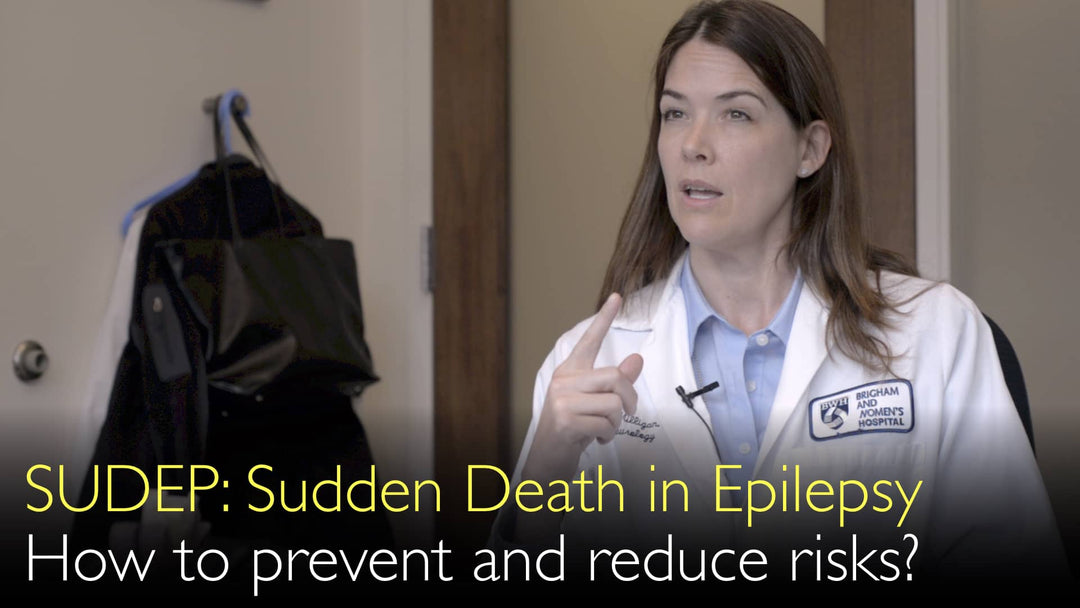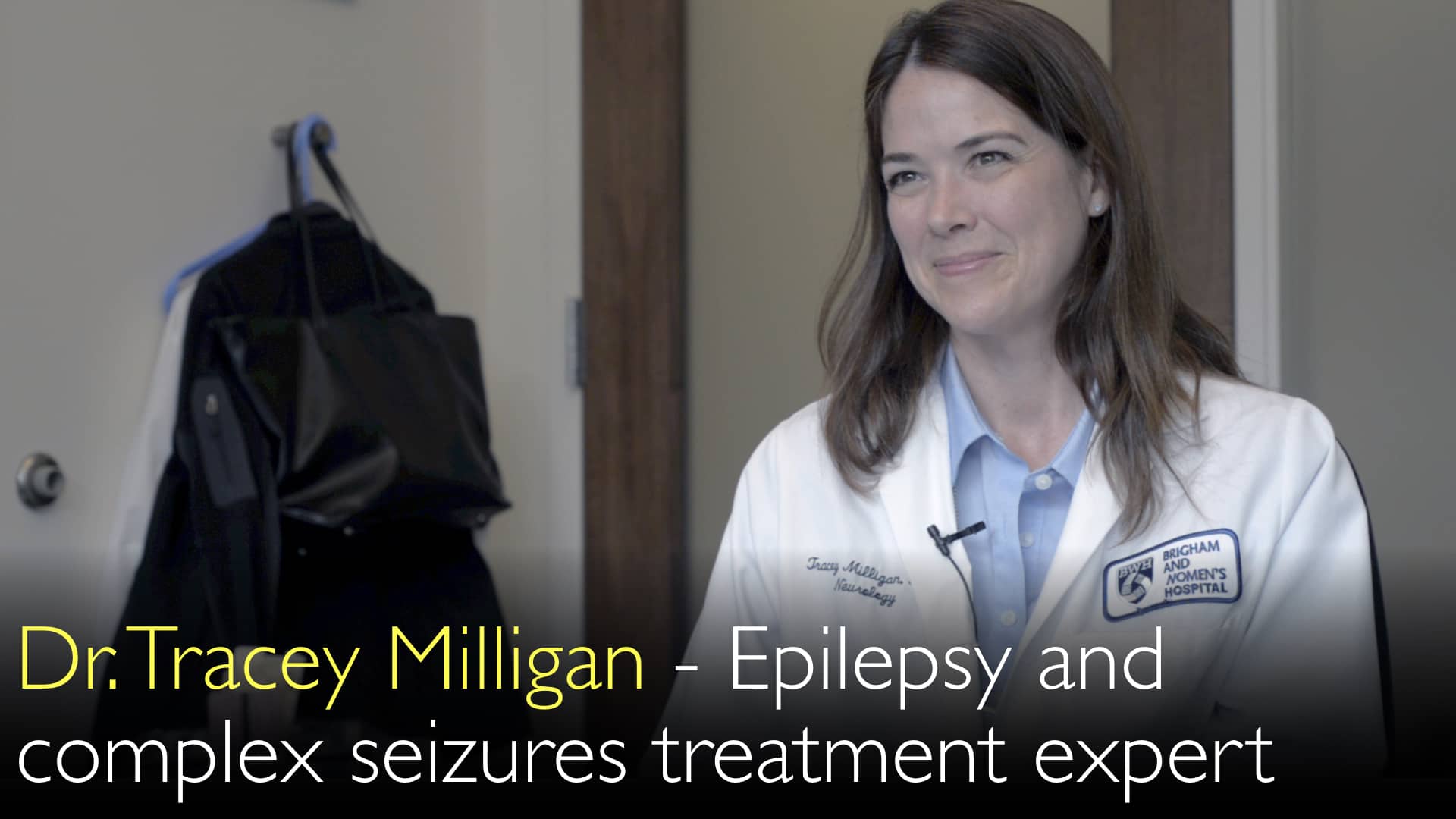Especialista renomada no diagnóstico e tratamento da epilepsia, a Dra. Tracey Milligan, MD, aborda os riscos e a prevenção da Morte Súbita Inesperada na Epilepsia (SUDEP). Ela detalha as taxas anuais de incidência, que são de 1 em 4.500 para crianças e 1 em 1.000 para adultos. A Dra. Milligan aponta os principais fatores de risco, incluindo crises tônico-clônicas generalizadas não controladas e o hábito de dormir sozinho. Ela também explora a relação crucial entre epilepsia e depressão, enfatizando a importância do cuidado integral do paciente e da educação para reduzir todos os riscos.
Compreensão e Prevenção da Morte Súbita Inesperada na Epilepsia (SUDEP)
Navegar para a Seção
- Fatores de Risco e Estatísticas da SUDEP
- Estratégias para Prevenir a Morte por SUDEP
- A Ligação Crítica entre Epilepsia e Depressão
- Reconhecendo o Risco de Suicídio na Epilepsia
- Uma Abordagem Abrangente para o Tratamento da Epilepsia
- Transcrição Completa
Fatores de Risco e Estatísticas da SUDEP
A Morte Súbita Inesperada na Epilepsia, ou SUDEP, é uma preocupação importante para pacientes com transtornos convulsivos. Segundo a Dra. Tracey Milligan, embora o risco geral seja baixo, trata-se de uma complicação real e relevante. O risco anual de SUDEP é de cerca de 1 em 4.500 para crianças e sobe para 1 em 1.000 para adultos.
Isso significa que, a cada ano, 999 em cada 1.000 adultos com epilepsia não serão afetados pela SUDEP. No entanto, a conscientização é fundamental, pois certos fatores aumentam significativamente o risco individual, e há medidas preventivas disponíveis.
Estratégias para Prevenir a Morte por SUDEP
A prevenção da SUDEP concentra-se na redução dos fatores de risco conhecidos. A Dra. Tracey Milligan explica que o risco de morte súbita é três vezes maior em pacientes com crises tônico-clônicas generalizadas (convulsões de grande mal) não controladas. Portanto, a etapa mais importante para prevenir a SUDEP é buscar atendimento neurológico especializado para obter o controle ideal das crises.
Outro fator de risco modificável importante é dormir sozinho. A Dra. Tracey Milligan observa que ter alguém no quarto, como um cônjuge ou familiar, pode permitir uma intervenção mais rápida em caso de crise noturna. Essa supervisão é uma estratégia simples, mas eficaz, para ajudar a reduzir o risco de um desfecho fatal.
A Ligação Crítica entre Epilepsia e Depressão
A relação entre epilepsia e saúde mental é profunda e bidirecional. A Dra. Tracey Milligan destaca que pacientes com epilepsia têm um risco significativamente maior de desenvolver depressão. Por outro lado, indivíduos com depressão também apresentam maior probabilidade de receber um diagnóstico de epilepsia mais tarde na vida.
A Dra. Milligan cita um exemplo marcante de sua discussão com o Dr. Anton Titov: um paciente com histórico de depressão e tentativa de suicídio tem um risco cinco vezes maior de desenvolver epilepsia. Essa forte conexão ressalta a necessidade de um cuidado integrado que aborde tanto a saúde neurológica quanto a psiquiátrica.
Reconhecendo o Risco de Suicídio na Epilepsia
A vigilância em relação ao risco de suicídio é um componente vital do tratamento da epilepsia, especialmente no momento do diagnóstico. A Dra. Tracey Milligan afirma que o risco de suicídio é particularmente elevado quando os pacientes recebem o diagnóstico de epilepsia. Esse período pode ser marcado por medo, incerteza e uma sensação de perda de controle, contribuindo para um sofrimento emocional intenso.
Reconhecer esse estado de vulnerabilidade é o primeiro passo para a prevenção. A triagem proativa de sintomas depressivos e ideação suicida permite que os profissionais de saúde intervenham precocemente com tratamento e suporte adequados, protegendo o bem-estar geral do paciente.
Uma Abordagem Abrangente para o Tratamento da Epilepsia
O tratamento eficaz da epilepsia vai muito além da simples prescrição de medicamentos. Um plano de cuidado abrangente deve abordar todo o espectro de riscos associados ao diagnóstico. Como descreve a Dra. Tracey Milligan, isso inclui esforços concentrados para prevenir a SUDEP, tratar ativamente a depressão coexistente e mitigar o risco de suicídio.
Além disso, a prevenção de lesões físicas decorrentes de crises é alcançada por meio da educação completa do paciente, seus amigos e familiares. Esse modelo holístico de cuidado, que considera tanto a saúde física quanto a mental, é essencial para otimizar a segurança e a qualidade de vida das pessoas que vivem com epilepsia.
Transcrição Completa
Dr. Anton Titov, MD: Epilepsia e risco de morte súbita. Pacientes com crises epilépticas também têm um risco aumentado de morte súbita. Isso é chamado de Morte Súbita Inesperada na Epilepsia. A abreviação é SUDEP.
Qual é o risco de morte súbita em pacientes com epilepsia? O que explica os riscos de morte súbita na epilepsia? Como diminuir o risco de morte súbita na epilepsia?
Dra. Tracey Milligan, MD: Sim, a SUDEP, morte súbita inexplicada na epilepsia, é muito importante para os pacientes com epilepsia estarem cientes. O risco de SUDEP é baixo. O risco em crianças é de cerca de 1 em 4.500 por ano. O risco em adultos é de 1 em 1.000 por ano.
Podemos dizer que, em adultos, 999 não terão SUDEP. Mas é importante estar ciente da morte súbita na epilepsia, pois existem medidas que podemos tomar para reduzir o risco de SUDEP.
O risco de morte súbita na epilepsia é três vezes maior em pacientes com crises tônico-clônicas generalizadas não controladas. Pacientes com crises não controladas têm um risco aumentado de morte súbita na epilepsia.
É importante que busquem atendimento especializado. Também sabemos que pacientes que dormem sozinhos têm um risco maior de SUDEP. Provavelmente porque, se têm uma crise tônico-clônica generalizada na cama, não há ninguém para assistir.
Ter alguém no mesmo quarto durante a noite, como um parente ou cônjuge, pode monitorar o paciente com epilepsia, e qualquer problema pode ser identificado mais rapidamente.
Existem estratégias que podemos usar para ajudar a reduzir o risco de morte súbita na epilepsia. A SUDEP é importante, mas não é a única causa aumentada de morte para pacientes com epilepsia.
Há outros riscos dos quais os pacientes precisam estar cientes, como o risco de depressão na epilepsia. Pessoas com epilepsia têm um risco maior de depressão, e o inverso também é verdadeiro.
Pacientes com depressão têm um risco maior de desenvolver epilepsia. Por exemplo, um paciente com histórico de depressão e tentativa de suicídio tem um risco cinco vezes maior de desenvolver epilepsia ao longo da vida.
O risco de depressão e suicídio é especialmente alto quando os pacientes são recém-diagnosticados com epilepsia. É importante reconhecer esses riscos.
Devemos pensar em prevenir a SUDEP, prevenir e tratar a depressão, e também ajudar a evitar lesões por epilepsia por meio da educação do paciente, seus amigos e familiares.
A Morte Súbita Inesperada na Epilepsia, SUDEP, é uma complicação temida das crises.





